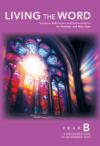Scripture Study for
Twelfth Sunday in Ordinary Time
Jeremiah 20:10–13 / Psalm 69:14c / Romans 5:12–15 / Matthew 10:26–33
<< Back to LECTIONARY RESOURCES
Understanding the Word
By Br. John R. Barker, OFM
Just prior to this week’s reading, Jeremiah has complained to God that God has “seduced” him—drawn him into a difficult mission of proclaiming God’s word of judgment to a faithless and violent people. In the face of rejection, the prophet has tried to walk away from his calling, but like a fire burning in his heart, the word of God demands to be heard (20:7–9). Yet despite danger and even the treachery of friends, Jeremiah ultimately trusts that God will defend him “like a mighty champion” because he is doing God’s work. In Jeremiah we see both the depths of suffering in relationship with God and the heights of trust and hope despite it all.
Paul explains to the Romans how the death of Christ has saved humanity from death and sin. Paul understands sin here not as a human act of the breaking of covenant commands (“law”), but as a malevolent, intractable power that entered the world through human disobedience. This power, which spread through all Adam’s descendants, brought with it death. Thus all people, even those who were not under the covenant obligations to God, sinned, even if they were not breaking “the law” (Torah). Thus death “reigned” over all. The obedience of Christ ends this reign by flooding humanity with grace, a gift from God to deliver the descendants of Adam from the bondage of sin and its “wages” of death (6:23).
As Jesus sends the Twelve out to proclaim the kingdom, he warns them of opposition. This warning shades into predictions of what the early church will face after Easter. Out of fear for their lives and livelihoods, they will be tempted to withdraw from the task of proclaiming the gospel, or even to deny Christ. Yet this is what they are being formed to do: to proclaim publicly what they are learning from and about Jesus. In the face of fear, they must remember not only that God cares for them, but also that even physical death is to be preferred to the spiritual death that would follow from apostasy or abandoning the call to proclaim the gospel.
